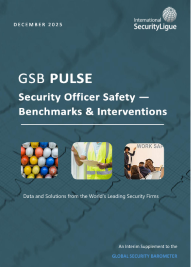
Arising from the success of its Global Security Barometer 2025 report, the International Security Ligue is announcing the creation of GSB Pulse, a twice-yearly complement to the GSB. To understand this new offering, we spoke with Stefan Huber, the Ligue’s Director General.
You’re announcing GSB Pulse, how does it fit together with the Ligue’s Global Security Barometer (GSB)?
SH: Our Global Security Barometer was never going to be just a report. It was always intended to be an evolving platform for measuring both the state of security around the world and the private security services industry, and to identify regional differences and areas needing improvement. GSB Pulse is a part of that framework and mission to analyze the status quo, drive change, and measure progress.
How did the idea for GSB Pulse come about?
Our Global Security Barometer was an extensive endeavor, covering 10 critical industry and security topics, attracting 17 expert co-authors, and featuring a survey of the world’s leading security executives, but it’s not something we can do every year—and from the success of the GSB we see there is enormous appetite for understanding where security is and how we can raise the bar.
How will GSB Pulse be different from the Barometer?
While the Barometer took an overview of global security and the security industry, GSB Pulse will focus more narrowly on singular industry topics or geographic regions. GSB Pulse editions will be more compressed than the 70-page GSB report, but just like the Barometer, GSB Pulse will be data driven and invite a range of perspectives to offer a roadmap to improvement.
What types of topics will GSB Pulse editions examine?
Our focus will be on those issues that don’t routinely get measured and examined. There are many security organizations producing important reports, but the scope of security is enormous; it reaches into so many other areas. There are countless issues that have never been analyzed and topics that have never been researched. It is rather astonishing, in fact, how often you find that basic data about our industry either doesn’t exist, is too old to be relevant, or is of unsound quality.
It is rather astonishing, in fact, how often you find that basic data about our industry either doesn’t exist, is too old to be relevant, or is of unsound quality.
Can you give an example?
Absolutely, and it is the subject of our first GSB Pulse. Public contracting for security services is an important topic, but nobody has ever done extensive research into it. And while there should be a high standard of integrity and transparency in all public tenders—to prevent corruption and be ensure good stewardship of taxpayer money—it is especially vital in security services where negative consequences and contract failures pose a risk to public safety. It affects all of us: you, me, everyone. To fill the void, we conducted research into 30,000-plus contracts and gigabytes of tender data in the private security sector, mostly in written formats.
The GSB offered a bridge between organizations, did you also align with other organizations to conduct the research into public security contracts?
We worked hand-in-hand with Open Contracting Partnership, which works globally to make public procurement fairer, more efficient, and more sustainable, and in conjunction with NASCO, which promotes public awareness of the vital role of private security in the U.S., shapes policy, and advocates for high standards and efficiency in licensing. The three of us formed a complementary team, which helps the central messages of each group reach new audiences. That is extremely important for us in security, because to make positive changes we must reach beyond our industry, like to public procurement professionals.
When will the results of the research be available?
The detailed data research report is expected to be finalized by the end of the year, and key takeaways from the analysis—along with proposed action items and perspectives—will be the subject of the first GSB Pulse to be released around the same time.
What other topics might you investigate in future editions of GSB Pulse?
Again, our focus is on collecting and analyzing data in areas that have been understudied. We think geopolitics, as it relates to private security, is one of those areas. We have other topics we are investigating, but we also encourage people to bring us their ideas. We want to measure aspects of security and the security industry that have gone untapped and where better understanding can yield a real difference.
We want to measure aspects of security and the security industry that have gone untapped and where better understanding can yield a real difference.
How does GSB Pulse align with the broader goals of the Ligue?
When you land on our website, you immediately read our commitment, which is to build a better industry and create a safer world. Measurement is absolutely essential to those goals. Doing research and investigations to measure how things are is a critical prerequisite to making progress. Quantifying the status quo is essential to identify weaknesses and point a path to improvement.
How can people get their hands on GSB Pulse editions when they come out? Is there a cost to subscribe?
It’s free. Everyone who downloads our Global Security Barometer 2025 report will automatically be notified when a new GSB Pulse is available. People can also go to the “Contact Us” page at our website and click the “Subscribe” option on the contact form.






